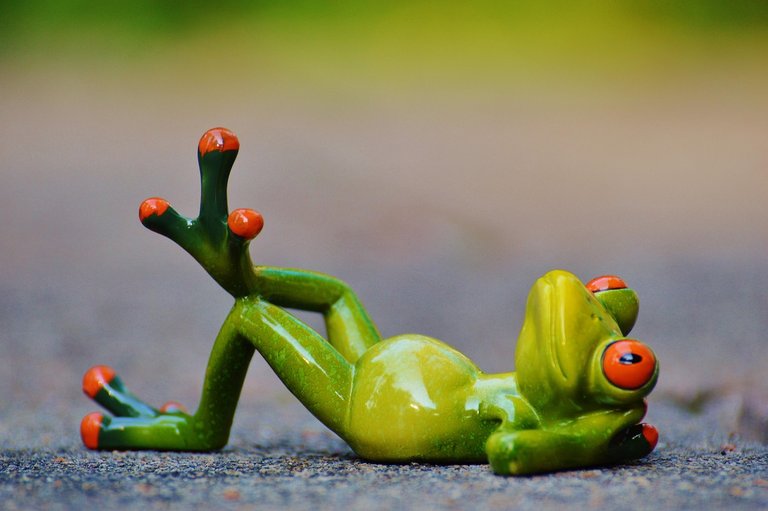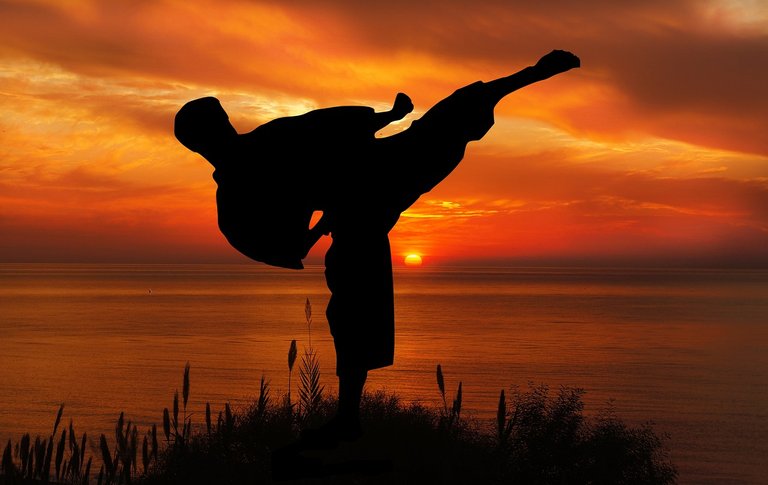
¡Hola mis queridos amigos! El tema que hoy les quiero compartir es Zanshin, una palabra japonesa que combina dos conceptos: "Zan" que significa "lo que sobra" y "Shin" que significa "mente". Entonces, ¿qué es lo que sobra en tu mente que no permite que te enfoques? ¿Qué te dispersa y no te deja concentrar?
Estuve investigando sobre el término Zanshin, y se encuentra en el contexto de las artes marciales, como el karate, y se refiere a estar alerta pero relajado. Las artes marciales no solo enseñan técnicas de combate, sino también una filosofía de vida y conciencia. En una técnica marcial, el objetivo es que la persona esté alerta, lista para responder a cualquier golpe, pero sin tensión excesiva. Suena un poco complicado, pero con mucha concentración se logra.

Imagina a un luchador en un combate de artes marciales mixtas (UFC) ; si el luchador se distrae mirando al público, corre el riesgo de ser noqueado. Es por ello, que debe mantener la calma y estar atento a cada detalle, tanto de su entorno como de su oponente.
Pero, la pregunta real sería, ¿Cómo utilizo ésto en mi vida?
Bueno, cuando aplicamos el concepto de zanshin a nuestra vida diaria, se trata de estar alerta pero relajado. Esto puede parecer contradictorio al principio, pero es esencial para enfocarnos y evitar la distracción. Si no estamos alerta, cualquier cosa puede distraernos y sacarnos de nuestra concentración.
La clave está en eliminar las distracciones de nuestra mente, dejando sólo lo esencial. Yo sé que es difícil, pero el hacerlo nos permite enfocarnos y estar presentes en cada momento. Por ejemplo, cuando trabajamos en un proyecto, es fácil que nuestra mente divague hacia el futuro, pensando en el resultado final en lugar de concentrarse en el proceso. Aplicando el Zanshin podemos no sólo concentrarnos en el proceso sino también disfrutarlo y estar atentos a que salga tal cual como lo queremos.

La palabra zanshin se dió a conocer en Occidente gracias al filósofo alemán Eugen Herrigel, quien enseñó en la Universidad Imperial de Sendai entre 1924 y 1929. En su libro "Zen en el Arte del Tiro con Arco", Herrigel describe cómo su maestro lo entrenó en la técnica del tiro con arco japonés. El maestro le enseñó a enfocarse más en el proceso que en el resultado, enfatizando la importancia de la técnica y la paciencia.
Practicar zanshin en nuestra vida diaria significa estar alerta y relajado al mismo tiempo. Esto puede aplicarse a cualquier situación, ya sea en el trabajo, en el estudio o en nuestras actividades cotidianas. Al mantener la calma y prestar atención a los detalles, podemos mejorar nuestra concentración y evitar la tensión innecesaria. Dicha tensión nos hace alterarnos, nos crea ansiedades insignificantes, lo cual puede llegar a que desistamos de concluir lo que estamos haciendo o en cualquier situación de la vida cotidiana. Ésto se evidencia diariamente, así que no solo se aplica en el trabajo, porque por ejemplo con tus hijos o padres, puede existir una diferencia de opiniones las cuales pueden crear ciertos estados de ánimo, los cuales no te permiten mantenerte en ese estado de alerta calmada.

Hay un proverbio japonés que dice: "Después de la batalla, ajusta tu casco". Esto significa que, aunque hayas alcanzado un objetivo, debes seguir alerta y preparado para los próximos desafíos. No te relajes demasiado después de una victoria, ya que siempre habrá nuevas batallas que enfrentar.
Educar nuestra mente para estar alerta pero relajada no es fácil, pero es esencial para disfrutar y aprender de nuestras actividades diarias. Conectar con el presente y mantener la serenidad nos permite vivir de manera más plena y equilibrada.
Vamos a educar nuestra mente y a integrar el zanshin en nuestro día a día. Es un ejercicio constante de conectarnos con nuestra verdadera energía y disfrutar del momento presente.
Coméntame tu experiencia si lo has hecho o piensas hacerlo.
Éste post lo hice en base a un live que transmití en mi instagram y quería compartirlo con la comunidad ya que me parece que es nutritivo para el desarrollo de cada uno de nosotros. Si quieres ver el programa completo ingresa aquí: https://www.instagram.com/reel/C8dEaJmhHUm/?igsh=MXA2dnJhcXZ5ODZkYg==
Todas las imagenes las descargue de https://pixabay.com/es/
Sé parte de Magia Uniserval y sus comunidades:
English

The Art of Relaxed Alertness : Discovering Zanshin
Hello my dear friends! The topic I want to share with you today is Zanshin, a Japanese word that combines two concepts: "Zan" which means "what is left over" and "Shin" which means "mind." So, what is left over in your mind that does not allow you to focus? What distracts you and does not let you concentrate?
I was researching the term Zanshin, and it is found in the context of martial arts, such as karate, and refers to being alert but relaxed. Martial arts not only teach combat techniques, but also a philosophy of life and consciousness. In a martial technique, the goal is for the person to be alert, ready to respond to any blow, but without excessive tension. It sounds a bit complicated, but with a lot of concentration it can be achieved.

Imagine a fighter in a mixed martial arts (UFC) fight; if the fighter is distracted by looking at the audience, he runs the risk of being knocked out. That is why you must remain calm and be aware of every detail, both of your surroundings and your opponent.
But the real question is, how do I use this in my life?
Well, when we apply the concept of zanshin to our daily life, it is about being alert but relaxed. This may seem contradictory at first, but it is essential to focus and avoid distraction. If we are not alert, anything can distract us and take us out of our concentration.
The key is to eliminate distractions from our mind, leaving only the essential. I know it is difficult, but doing so allows us to focus and be present in each moment. For example, when we work on a project, it is easy for our mind to wander into the future, thinking about the end result instead of concentrating on the process. By applying Zanshin we can not only focus on the process but also enjoy it and be aware that it turns out just the way we want it to.

The word zanshin was first introduced to the West by the German philosopher Eugen Herrigel, who taught at the Imperial University of Sendai between 1924 and 1929. In his book "Zen in the Art of Archery," Herrigel describes how his teacher trained him in the technique of Japanese archery. The teacher taught him to focus more on the process than the result, emphasizing the importance of technique and patience.
Practicing zanshin in our daily lives means being alert and relaxed at the same time. This can be applied to any situation, whether at work, in school, or in our everyday activities. By staying calm and paying attention to details, we can improve our concentration and avoid unnecessary tension. Such tension makes us upset, creates insignificant anxieties, which can lead to us giving up on finishing what we are doing or in any situation in everyday life. This is evident on a daily basis, so it doesn't only apply at work, because for example with your children or parents, there may be a difference of opinions which can create certain moods, which do not allow you to remain in that state of calm alertness.

There is a Japanese proverb that says: "After the battle, adjust your helmet." This means that, even if you have achieved a goal, you must remain alert and prepared for the next challenges. Do not relax too much after a victory, as there will always be new battles to face.
Educating our mind to be alert but relaxed is not easy, but it is essential to enjoy and learn from our daily activities. Connecting with the present and maintaining serenity allows us to live in a more full and balanced way.
Let's educate our mind and integrate zanshin into our daily life. It is a constant exercise of connecting with our true energy and enjoying the present moment.
Tell me about your experience if you have done it or plan to do it.
I made this post based on a live broadcast I made on my Instagram and I wanted to share it with the community because I think it is nutritious for the development of each one of us. If you want to see the full program, click here:
https://www.instagram.com/reel/C8dEaJmhHUm/?igsh=MXA2dnJhcXZ5ODZkYg==
All images were downloaded from https://pixabay.com/es/
Be part of Magia Universal and its communities: